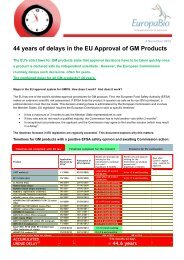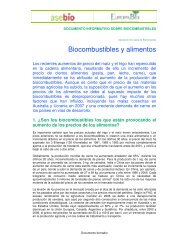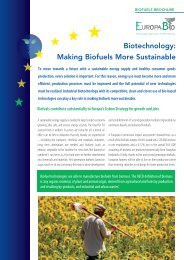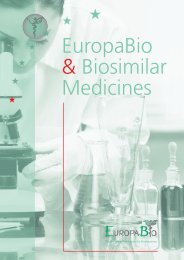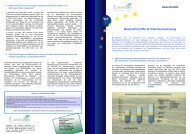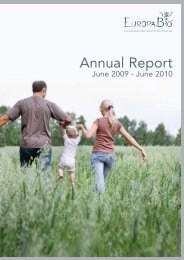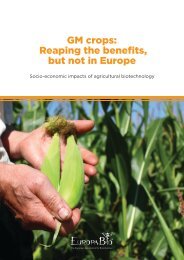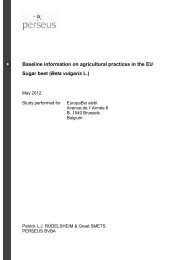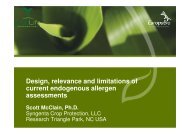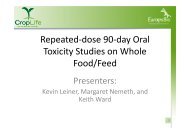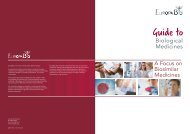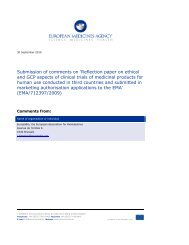Water wise solutions from agricultural biotechnology - Europabio
Water wise solutions from agricultural biotechnology - Europabio
Water wise solutions from agricultural biotechnology - Europabio
You also want an ePaper? Increase the reach of your titles
YUMPU automatically turns print PDFs into web optimized ePapers that Google loves.
Current research projects<br />
> The <strong>Water</strong> Efficient Maize for Africa (WEMA) partnership<br />
led by the African Agriculture Technology Foundation (AATF)<br />
is a five-year public-private partnership with the aim of<br />
developing new African drought-tolerant maize varieties,<br />
incorporating the best technology available internationally.<br />
The varieties developed through the project will be distributed<br />
to African seed companies through AATF without royalty and<br />
will be made available to smallholder farmers as part of their<br />
seed business. The national <strong>agricultural</strong> research systems,<br />
farmers’ groups, and seed companies participating in the<br />
project will contribute their expertise in field testing, seed<br />
multiplication, and distribution. The project will involve local<br />
institutions, both public and private, and in the process<br />
expand their capacity and experience in crop breeding,<br />
<strong>biotechnology</strong>, and biosafety. The current timing for the<br />
availability of the crop is 2017.<br />
Kenya has just announced its intention to commence field trials<br />
with this type of maize.<br />
> Hybrid crops such as maize have been developed to<br />
tolerate drought and periodic water deficits. During the next<br />
decade, a number of companies are planning to introduce GM<br />
crops that will further improve drought tolerance. While no<br />
plant can grow without water, hybrids and varieties are<br />
being developed that use water sources more efficiently and<br />
therefore perform better during water deficits. Maintaining<br />
yields during water stress will help preserve grower incomes<br />
and yield more grain for the food and energy value chain as<br />
well as reducing the need for irrigation.<br />
EuropaBio’s mission is to promote an innovative and dynamic<br />
<strong>biotechnology</strong>-based industry in Europe.<br />
For further information, please contact:<br />
EuropaBio Avenue de l’Armée, 6 - B-1040 Brussels<br />
Tel: +32 2 735 03 13 - Fax: +32 2 735 49 60 - greenbiotech@europabio.org<br />
www.europabio.org<br />
Printed on 100% recycled paper<br />
> This is not just at the research stage. Member companies<br />
have announced this year that they have made regulatory<br />
submissions in the United States and Canada for approval of<br />
drought-resistant maize, with the objective of launching the<br />
product in 2012.<br />
> Some research focusing on reducing the levels of PARP<br />
[poly(ADP-ribose) polymerase], a key stress-related protein in<br />
plants, resulted in oilseed rape which was far better able to<br />
survive drought than reference plants. Field trial results show<br />
relative yield increases of up to 44% compared to non-drought<br />
tolerant varieties. Research is currently underway on corn,<br />
cotton, oilseed rape and rice, with the objective of developing<br />
a new generation of stress-tolerant, high-performance crop<br />
varieties.<br />
> Further exciting work in this area involves the use of<br />
genetic switches called transcription factors and stress genes<br />
<strong>from</strong> microbial sources. Specific transcription factor genes<br />
have been tested that influence multiple other genes involved<br />
in the plant's response to stress. Drought tolerance has been<br />
improved, increasing productivity by at least two-fold during<br />
severe water stress.<br />
TM



